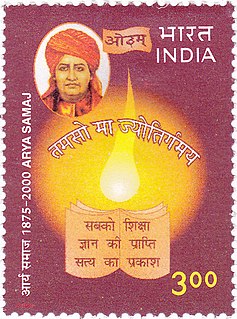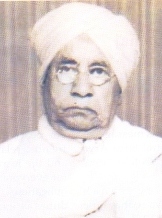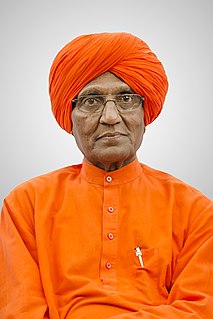
Dayananda Saraswati was an Indian philosopher, social leader and founder of the Arya Samaj, a reform movement of the Vedic dharma. He was the first to give the call for Swaraj as "India for Indians" in 1876, a call later taken up by Lokmanya Tilak. Denouncing the idolatry and ritualistic worship, he worked towards reviving Vedic ideologies. Subsequently, the philosopher and President of India, S. Radhakrishnan called him one of the "makers of Modern India", as did Sri Aurobindo.

Arya Samaj is a monotheistic Indian Hindu reform movement that promotes values and practices based on the belief in the infallible authority of the Vedas. The samaj was founded by the sannyasi (ascetic) Dayanand Saraswati on 10 April 1875..

The Arya Samaj was the first religious, cultural and educational Fiji Indian organisation established in Fiji. From its inception, in 1904, it attracted the young, educated and progressive Hindus into its fold. During the first three decades of the twentieth century, it was the sole voice of the Indian community in Fiji and as Fiji Indians won political rights, it was not surprising that first Indian members of the Legislative Council were all Arya Samajis. The influence of Arya Samaj over the Indians in Fiji gradually waned as other organisations representing Indians were established but it remained the dominant force in politics until 1959. The modern day Arya Samaj in Fiji still speaks out on issues affecting its members and its activities are visible through the numerous educational institutions that it manages.
Pandit Shri Krishna Sharma was an Arya Samaj preacher who came to Fiji in 1926 from Rajkot, India. He was a gifted public speaker and singer of religious songs. He provided impetus to the Arya Samaj movement in Fiji. Under his influence Arya Samaj schools and temples were established in Fiji. He was responsible for the establishment of the Hindu Maha Sabha for the purpose of uniting all Hindus in Fiji. He advocated shuddhi and this caused conflict with Muslims and Christians in Fiji.

Thakur Kundan Pal Singh Kush (1881–1967) was an Arya Samaj missionary and teacher who arrived in Fiji, from Muzaffarnagar, Uttar Pradesh, India in 1928. He first taught at the Dharamshala School in Nausori where he later became the founding Head Teacher of Vunimono Arya School in 1929. He taught in a number of Arya Samaj schools which included Gurukul Primary School near Lautoka in 1939, Arya Samaj Girls' School in Saweni, Lautoka, from 1940 to 1945, Swami Shraddanand Memorial School in Suva, Vunikavikaloa Arya School in Ra, and Veisari Primary School near Suva.

The Arya Pratinidhi Sabha of Fiji is the national body for all the Arya Samajs in Fiji. It was formed in 1918 and registered as a religious body through the efforts of Manilal Doctor, who was in Fiji from 1912 to 1920 at the behest of Mahatma Gandhi to provide legal assistance to the Fiji Indians. Its first President was Swami Manoharanand Saraswati who had arrived in Fiji, from India, in 1913. The Arya Pratinidhi Sabha of Fiji is affiliated to Sarvadeshik Arya Pratinidhi Sabha based in New Delhi.

Suriname has possibly the highest proportion of Hindus who are Arya Samajis, compared to any other country. In Suriname, the Hindu population had split, with roughly 20% following the teachings of Swami Dayanand Saraswati, founder of the Ārya Samāj, and 80% following the Sanatan Dharm. According to the census of 2012 the number of Ārya Samājĩs is 16,661. The arrival of Arya Samaj preachers in Suriname, in 1929, caused a rift in the Hindu community, between the followers of Sanātanī and the Ārya Samāj.

Agnivesh, referred to as Swami Agnivesh, was an Indian social activist and the founder of Arya Sabha, a political party based on the principles of Arya Samaj. He also served as a cabinet minister in the state of Haryana. He is best known for his work against bonded labour through the Bonded Labour Liberation Front, which he founded in 1981.

The Arya Samaj was founded in Nairobi on 5 July 1903, at a meeting at the home of Jai Gopal attended by forty-five people. The small group of Arya Samajis immediately began plans for a centre for its members and on 11 September 1903, the foundation for the first Arya Samaj building in East Africa was laid. Today there is a seven-storey building on this site.

Arya Samaj in Tanzania had been in existence since the early 1900s and prior to independence the whole of East Africa was served by a single Arya Samaj. After independence a separate Pratinidhi Sabha was formed in Tanzania on 19 July 1974.
Arya Samaj has existed in Singapore since 1927 and runs Hindi classes at its premises through the Dayanand Anglo-Vedic Schools System.

Arya Samaj was formed in Mozambique following the visit by Arya Samaji preacher, Bhawani Dayal, when Hindus in the capital, Lourenço Marques, formed the Bharat Sabha in 1933, on the basis of Vedic teachings. A Veda Mandir (temple) was built in 1937 and many Arya Samaji preachers visited the Mandir in subsequent years.

Arya Samaj is a Hindu reform movement in Mauritius. Established in 1911, the Arya Paropkarini Sabha was officially registered in 1913. Since its creation Arya Samaj has had a great influence on the religious, social, educational and political lives of the people of Indian origin on the island. It has endeavoured to uphold the principles and ideals set forth by Maharishi Dayanand and his reformist movement. Some of the more notable ideals are women parity and free access to education. It has provided Hindus with a choice of progressive Hinduism, has promoted education with particular emphasis on Hindi and established orphanages, primary schools, colleges and tertiary institution.

The availability of Satyarth Prakash, inspired some people of Indian origin in Bangkok to follow the teachings of Swami Dayanand Saraswati and form the Vedic Dharam Pracharni Sabha on 5 May 1920. Weekly gatherings were held for the propagation of Vedic religion. Land was purchased and a Vedic mandir (temple) constructed. A library was also established. In 1922 the name of the Sabha (organisation) was changed to Arya Samaj and in 1923 it was affiliated with the Arya Pratinidhi Sabha of Uttar Pradesh in India. Although a small organisation, the Sabha has raised funds for relief fund for natural disasters in India. It also organises the celebration of Hindu festivals.

The earliest efforts to establish the Arya Samaj in Trinidad and Tobago were made by visiting missionaries in the beginning of the 20th century. In the 1930s their activities led to the establishment of a new organisation, which first was called the Arya Samaj Association, but later was renamed Arya Pratinidhi Sabha of Trinidad. The main activity of the sabha was giving support to the construction of Aryan temples and schools. Unfortunately the organisation was frequently plagued by split-offs, which caused a decrease of its membership.

Satyarth Prakash is an 1875 book written originally in Hindi by Dayananda Saraswati, an influential religious and social reformer and the founder of Arya Samaj. It is considered one of his major scholarly works. The book was subsequently revised by Swami Dayanand Saraswati in 1882 and has now been translated into more than 20 languages including Sanskrit and several foreign languages like English, French, German, Swahili, Arabic and Chinese. The major portion of the book is dedicated to laying down the reformist advocacy of Swami Dayanand with the last three chapters making a case for comparative study of different religious faiths.

Swami Shraddhanand, also known as Mahatma Munshi Ram Vij, was an Indian Independence activist and an Arya Samaj sannyasi who propagated the teachings of Dayananda Saraswati. This included the establishment of educational institutions, like the Gurukul Kangri University, and played a key role on the Sangathan and the Shuddhi (purification), a Hindu reform movement in the 1920s.
Pundit Ganga Prasad (1871-1968) was an Arya Samaji writer and a member of Indian National Congress who was solely responsible for bringing anti-conversion laws to negate the Christian missionary activities. He also believed in Aryan invasion theory. He opposed the Partition of India and was a staunch and ardent follower of Mahatma Gandhi. He served as professor of Meerut College at Allahabad University and as chief judge at Tehri, Garhwal District, from which post he retired to serve the Arya Samaj full-time. He was the father of Swami Satya Prakash Saraswati, another notable Arya Samaji author.

Lala Hansraj also known as Mahatama Hansraj, was an Indian educationist and a follower of Arya Samaj movement founder, Swami Dayanand. He founded, with Gurudatta Vidhyarthi, the Dayanand Anglo-Vedic Schools System (D.A.V.) in Lahore in 1886, where the first D.A.V. school was set up in memory of Dayanand who had died three years earlier.









